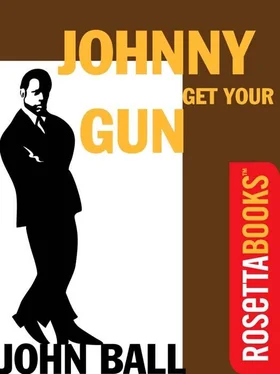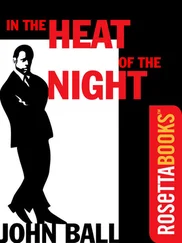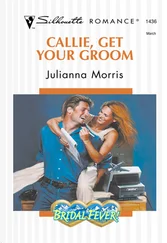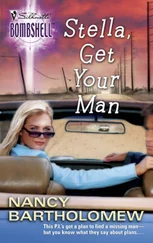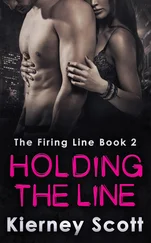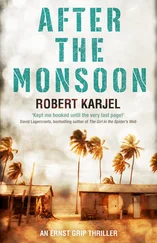John Ball - Johnny Get Your Gun
Здесь есть возможность читать онлайн «John Ball - Johnny Get Your Gun» весь текст электронной книги совершенно бесплатно (целиком полную версию без сокращений). В некоторых случаях можно слушать аудио, скачать через торрент в формате fb2 и присутствует краткое содержание. Год выпуска: 1969, ISBN: 1969, Издательство: RosettaBooks, Жанр: Полицейский детектив, на английском языке. Описание произведения, (предисловие) а так же отзывы посетителей доступны на портале библиотеки ЛибКат.
- Название:Johnny Get Your Gun
- Автор:
- Издательство:RosettaBooks
- Жанр:
- Год:1969
- ISBN:978-0-7953-1760-6
- Рейтинг книги:5 / 5. Голосов: 1
-
Избранное:Добавить в избранное
- Отзывы:
-
Ваша оценка:
- 100
- 1
- 2
- 3
- 4
- 5
Johnny Get Your Gun: краткое содержание, описание и аннотация
Предлагаем к чтению аннотацию, описание, краткое содержание или предисловие (зависит от того, что написал сам автор книги «Johnny Get Your Gun»). Если вы не нашли необходимую информацию о книге — напишите в комментариях, мы постараемся отыскать её.
Johnny Get Your Gun — читать онлайн бесплатно полную книгу (весь текст) целиком
Ниже представлен текст книги, разбитый по страницам. Система сохранения места последней прочитанной страницы, позволяет с удобством читать онлайн бесплатно книгу «Johnny Get Your Gun», без необходимости каждый раз заново искать на чём Вы остановились. Поставьте закладку, и сможете в любой момент перейти на страницу, на которой закончили чтение.
Интервал:
Закладка:
The baseball action was still going on: a handful of gray uniforms were now mixed in as the Detroit players added their contribution to the effort. Up on the vaulting framework above the scoreboard the tiny car was visible just where it had been. Angrily Tibbs reminded himself that it could not have moved, he had ordered the power cut off.
Bowsfield touched him on the shoulder; he turned to find himself facing a firmly built man whose face he instantly recognized. “This is Virgil Tibbs,” Ted said quickly and then completed the introduction. “Gene Autry.”
As soon as the two men had shaken hands Tibbs took the floor. “Mr. Autry, some time ago at a personal appearance you spent a moment with that boy up there on the sign. You’ve been his hero ever since, and he trusts you completely. Will you help?”
“In any way that I can.”
“Sir, by any chance do you have any of your cowboy regalia here at the stadium, anything at all? Even a ten-gallon hat?”
The owner of the Angels studied him for a moment. “I haven’t made pictures for years,” he said.
“You forget television, sir. Johnny McGuire, the boy up there, has seen you repeatedly. To him you’re the greatest cowboy who ever lived.” Virgil drew breath. “That goes for both of us,” he added.
Gene Autry understood, he picked up a telephone which sat on the counter of the private box. “Get me Disneyland,” he directed.
Tibbs stood silently beside Ted Bowsfield while the connection was made, and the call put through to the administrative offices at the amusement park.
“This is Gene Autry, at the stadium. I need something and I need it fast. I want a horse sent over here, fully saddled and ready to ride. A chestnut with a white blaze if you can do it, one that might pass for Champion.”
He listened a moment.
“That’s right, I don’t care who you have to take it away from, this is an emergency and a big one. Please get that horse over here on the double. One more thing-don’t come in the back way. Bring it in through the front gate, it’ll be open and someone will be waiting for you. No more than fifteen minutes at the outside, never mind what it costs.”
He hung up. “They’ll do it,” he said, then he looked at Tibbs. “Do you think that this is going to work?”
“When you met that boy,” Virgil answered, “you called him your pal. He’s an underprivileged lad; to him that was next to the voice of God.”
“I used to sing a song that might apply here,” Autry said. He led the way out of the executive boxes and across the aisle to the office area.
“‘Back in the Saddle Again,’” Tibbs supplied.
Autry looked at him. “You remember?”
“I was a boy too, sir; not too long ago. A Negro boy in the deep South, but that didn’t make any difference.”
The Angel owner led the way into his office suite. Then he slipped out of his coat and dropped it across a chair. He opened a closet door and reached in for a replacement. “Years ago,” he said, “a boy was sick in a hospital. It was in Boston as I remember. He asked for me and I went out to see him-in a business suit. He took one look and burst out crying. Then he said that I wasn’t Gene Autry because Gene Autry was a cowboy. I didn’t look the part. I learned something that day; now I’m prepared.”
“Suppose we wait outside,” Virgil suggested.
Eight minutes later Gene Autry, the heels of his cowboy boots clicking on the hard concrete, joined them. Virgil Tibbs took one careful look at him and his heart lifted; if this wasn’t the answer, then he doubted if one existed on the face of the earth. “I’ve just lost twenty years,” he said.
Autry gave him a shrewd look. “You may not be the best detective that Pasadena has,” he commented, “although I suspect that you are. But you’re a hell of a good psychologist. Let’s go.”
Ted Bowsfield drove the golf cart down the ramps with Gene Autry beside him and Virgil hanging on the back. When they reached the foyer area the horse had not yet appeared; they dismounted from the vehicle and reconciled themselves to an unavoidable delay.
Virgil turned to one of the several waiting ushers. “Any change?” he asked.
“No, sir, nothing we can see.”
At that precise moment inspiration hit Tibbs. “Is the organist for the stadium still here by any chance?” he asked Ted.
“I think he is, do you want him?”
“Yes.”
Bowsfield nodded and the usher took off in the golf cart. There was still no sign of the horse from Disneyland or any guarantee that one had been dispatched. Gene Autry was turning toward the lobby telephones when a girl came hurrying out from the office there. “Your horse is on the way, Mr. Autry,” she reported. “It should be here in the next few minutes, if the traffic isn’t too bad.”
“It had better not be. Thank you.” Autry replied.
The whine of the golf cart drew attention; it pulled up with the usher driving and a slender man beside him. Virgil did not waste time asking for his identity. “Can you play ‘Back in the Saddle Again’?” he inquired.
“In what key would you like it?” the organist responded.
“I’ll leave that up to you. Now here’s the plot-it’s vitally important that that poor frantic boy out there be completely convinced who it is when he sees Mr. Autry appear. The right music would help a lot.”
“I understood, leave it to me. Just give me a cue when to begin.”
A squeal of rubber came from outside as a horse van drew up. “Who’s the stage manager?” Autry asked.
“Virgil,” Ted Bowsfield replied.
“Then let’s go,” Tibbs said. “All we need is time to get back where we were and to make sure that someone is still standing by that power switch. When it’s time for the organ music I’ll signal, you’ll know. Ted, can we go now?”
A few seconds later, in the golf cart, they were making excellent time down the deserted wide aisle provided for the patrons, then they dived down a ramp and were back in the underground complex. At full speed the cart stirred up a considerable breeze as it plunged down the last long tunnel and came out once more close to the left field bullpen. Sergeant Wilson was waiting for them there.
“No one, absolutely no one, is to run out onto the field under any circumstances,” Virgil directed. “Even if he has to be restrained by force. That includes the boy’s father. If we get the boy down, we’re still not entirely out of the woods. We’ve got to disarm him and keep him from bolting.”
“Right,” Wilson agreed.
Virgil looked up and saw the organist wave from the press box area. “It looks like we’re all set. Ted, can you get the players in off the field? Just as though an inning had ended?”
“Of course.”
“All right, let’s get on with our little play.” Tibbs locked his fingers together and squeezed them. “At least we’ve got a top star.”
There was the whine of a golf cart and an usher appeared. “Mr. Autry wants to know how many shots the boy has fired.”
“Four,” Virgil answered immediately, then he looked at Bowsfield and amplified the statement. “One into a playmate’s house, two when he was stopped in the street, one at your usher. Correction: not at your usher, he deliberately aimed at the ceiling. The nick the bullet made was four feet in front of where your man fell down and almost five feet to the left. Even an inexperienced child couldn’t miss that badly in a confined space at very short range.”
The stadium manager was visibly startled. “You see things, don’t you,” he commented.
“That’s my business,” Tibbs replied.
The usher departed with the desired information and instructions to deliver a message at the clubhouse. Moments later Bill Rigney, the Angel field manager, appeared at the top of the dugout and waved his arm. Immediately the mock baseball practice ceased; the players from both teams ran at a jog toward the bench and quickly filled up most of the available space. In the sinking sun of late afternoon the vast stadium seemed quite abruptly to become stagnant and still.
Читать дальшеИнтервал:
Закладка:
Похожие книги на «Johnny Get Your Gun»
Представляем Вашему вниманию похожие книги на «Johnny Get Your Gun» списком для выбора. Мы отобрали схожую по названию и смыслу литературу в надежде предоставить читателям больше вариантов отыскать новые, интересные, ещё непрочитанные произведения.
Обсуждение, отзывы о книге «Johnny Get Your Gun» и просто собственные мнения читателей. Оставьте ваши комментарии, напишите, что Вы думаете о произведении, его смысле или главных героях. Укажите что конкретно понравилось, а что нет, и почему Вы так считаете.
